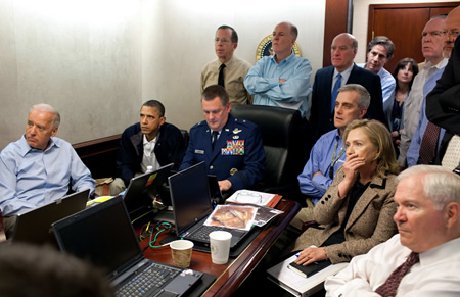Adil Najam
What do Pakistanis think about how Osama Bin Laden met his end, the implications of that end?

There are as many opinions on what happened in Abbottabad as there are Pakistanis. Maybe more. But there is no sense whatsoever where the government of Pakistan (or any of its major institutions) stand on what happened – or stood when it was happening. For 36 hours now the world has been waiting to see what Pakistan does and says – the silence and incoherence from Islamabad has not just been embarrassing, it has been damning. Finally, key institutions in Pakistan have begun trying to piece a narrative together – unfortunately it is way too late and the narrative itself rather lame.
Read Full Post
Adil Najam
 Late during the night between May 1 and May 2 in Pakistan there was news floating of a low-flying helicopter having blown up in the city of Abbottabad. There was much speculation, some wild rumors, but no confirmation of what had happened. Then, late night May 1 US East Coast Time (some six hours after the news about from Abbottabad had first started circulating in Pakistan), television screens in the US started flashing a notice that President Barack Obama would soon speak to the nation on a security issue. Rumors and speculation started flashing again.
Late during the night between May 1 and May 2 in Pakistan there was news floating of a low-flying helicopter having blown up in the city of Abbottabad. There was much speculation, some wild rumors, but no confirmation of what had happened. Then, late night May 1 US East Coast Time (some six hours after the news about from Abbottabad had first started circulating in Pakistan), television screens in the US started flashing a notice that President Barack Obama would soon speak to the nation on a security issue. Rumors and speculation started flashing again.

(Unconfirmed – and, now, reportedly fake – photo of Osama Bin Laden’s dead body being shown on a private TV channel in Pakistan)
Soon it was confirmed that the news was that Osama Bin Laden had been killed: President Obama then confirmed that ke was killed in Pakistan, in Abbottabad, in an operation led by the US but conducted with support of Pakistani authorities (still not clear how much support, and whose). Reportedly, the US now has possession of Osama Bin Laden’s body.
This is a huge development in the War on Terror, even if Osama Bin Laden’s actual role had now become symbolic rather than operational. It is a development that also has huge implications for Pakistan, and for Pakistan-US relations.
Read Full Post
Adil Najam
On May 1, Labour Day 2011, four new jobs were created in Balochistan when Chief Minister Nawab Muhammad Aslam Raisani expanded his Provincial Cabinet by four: Rubina Irfan, Ali Madad Jatak, Nasir Jamali and George Jaffar. Here is the news which is nearly not even news any more: The Balochistan Provincial Cabinet (Ministers and Advisers) is now 51 – and the size of the Balochistan Assembly is 64!
Balochistan Chief Minister Nawab Muhammad Aslam Raisani is, of course, a master political strategist. If you have forgotten his famous “Degree, Degree hai. Jali ho ya assli!” line, here is a reminder.
More importantly, this video sheds light on the Raisani Theory of Inclusive Governance and Job Creation. Do please listen to the whole thing. After a recall of the “Degree, Degree hai” line, at around 0.35 minute he starts confronting people who have blocked a road. When told that they are doing so because they do not have jobs, here is his response (at 0.55 minute):
“Jo berozgaar hai woh siyasat meiN hissa lay. Agar uss ka qismat lag gaya tou wazir banay ga, nahiN tou faqir banay ga!”
“Anyone who is without a job should take part in politics. If their luck is good, they will become Ministers. If not, then beggars!”
Read Full Post


 Late during the night between May 1 and May 2 in Pakistan there was news floating of a low-flying helicopter having blown up in the city of Abbottabad. There was much speculation, some wild rumors, but no confirmation of what had happened. Then, late night May 1 US East Coast Time (some six hours after the news about from Abbottabad had first started circulating in Pakistan), television screens in the US started flashing a notice that
Late during the night between May 1 and May 2 in Pakistan there was news floating of a low-flying helicopter having blown up in the city of Abbottabad. There was much speculation, some wild rumors, but no confirmation of what had happened. Then, late night May 1 US East Coast Time (some six hours after the news about from Abbottabad had first started circulating in Pakistan), television screens in the US started flashing a notice that 























































